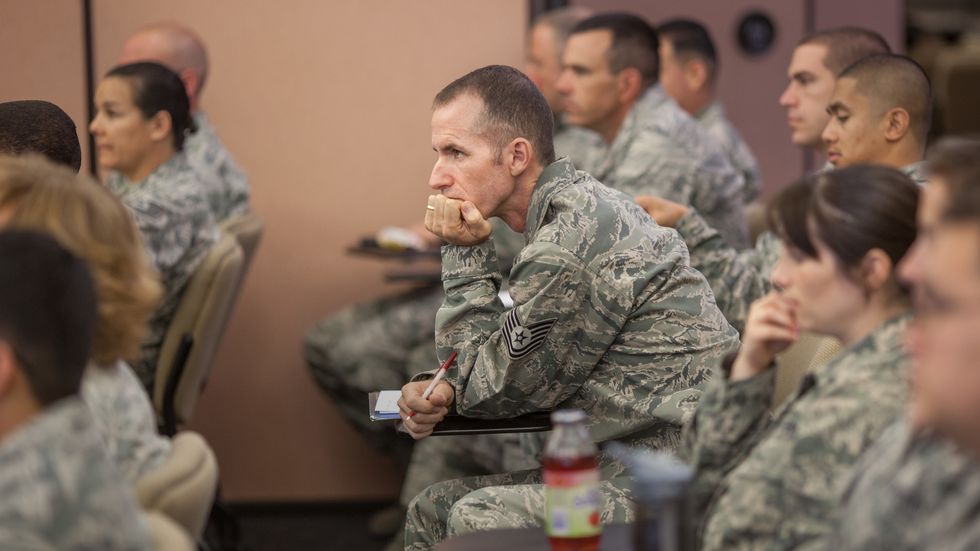When senior year is ending, you have these windows [try not to lick them 😉] of opportunity to choose from. Two of the three options are joining the military, and college which is the more common path. Both paths are quite similar if you look at them in a different light.
Disclaimer: I am not trying to undermine the significance of one answering the call to service. However, both are equally hard. The military is not for everyone, just the same as college is not for everyone.
Here are a few of the similarities between the two options.
1. The BIG Test
When signing up for the military, you take the ASVAB [Armed Services Vocational Aptitude Battery]. When applying to college, you take either the SAT/ACT. Each of the tests are acronyms with the letter A in them, and speaking of letter A, both types of tests are multiple choice. These tests also are very time consuming. The ASVAB has 10 sections: Word Knowledge, Paragraph Comprehension, Arithmetic Reasoning, Mathematics Knowledge, General Science, Electronics Information, Auto Information, Shop Information, Mechanical Comprehension, and Assembling Objects. The SAT/ACT are very similar except for the fact that the ACT covers science and engineering concepts, whereas both cover Writing, Reading, and Math. Then there is the score. The ASVAB is scored up to 99 points, whereas the SAT[new] can be up to 1600 points, and the ACT maximum is 36 points. Now where do these scores lead you? With the ASVAB your scores determine which branches of service you are eligible for, and within those services, your score determines your eligibility for specific jobs (rates, military occupational specialties, or specialty codes). With the ACT/SAT colleges look at these scores to determine your eligibility for matriculation, or deferment for the next acceptance period (early action, regular action I, and II).
2. The Choices
When it comes to the military and college, there are so many choices to choose from. With the military, there a number of branches to choose from including the Coast Guard, Navy (Active, FTS, Reserves), National Guard (Air, Army), Marine Corps (Active, Reserves), Air Force (Active, Reserves), and Army (Active, Reserves). When it comes to colleges and universities there are too many to list. However, there are a few types including technical colleges, community colleges, and four-year universities, some offer graduate studies, but for the most part undergraduate studies are the focus. At the end of the day, with either option there is a lot of thinking. Just make sure that you’re able to answer the question, which one is better for me?
3. The Process
There is nothing more tedious than the processes for both applying to college and joining the military. The process for the military includes a visit to the local MEPS, Military Entrance Processing Station. Applicants wake up in the early hours of the morning [like 0500] and are bussed over from a hotel to begin the process. MEPS consists of taking the ASVAB [if they haven’t already], a tedious physical [biometrics, drug/alcohol test, urine and blood tests, basic muscle and flexibility tests, and an interview with the doctor], medical history questionnaire, some branches conduct some form of a physical fitness test, and then finally job selection, and swearing in [enlisting, usually into a Delayed Entry Program (DEP) where they are waiting to ship out to boot camp]. On the college side, there is the haunting phrase, FAFSA [Free Application for Federal Student Aid], and the Common App. If students want to have any hope of having any money for college that their parents aren’t gifting them or don’t already have a lump some of cash on their hands, prospective college applicants must fill this form out. The Common App is a savior in form form (hahaha don’t worry I laughed too). Instead of filling out applications that are college specific, the Common App condenses the applications for approximately 680 different colleges and universities (from CollegeData) into a single application. Although the processes are not the same for college and the military, anyone can agree, they are both equally as tedious.
4. The Deception
Military recruiters and College recruiters alike are masters of the twisted and bent word. Neither will find a way to turn you away unless it is blatantly obvious. When you attend a college fair, it is often like watching an infomercial. The admissions representative will say anything they can think of that is enticing (whether it’s true or not) to convince you that their university is the right fit for you. Although they might know in their mind that there are better colleges for you, odds are they won’t tell you unless they don’t mind losing a few applicants in their vast pool of others. Military recruiters are the same way, they will say anything in their power to get you to sign on the dotted line, to the extent of offering you an enlistment bonus. With that being said, independent research, and talking to other people are the way to go. Also, it is good to conduct visits. With college, visit multiple campuses before committing yourself to any. With the military, visit multiple recruiting offices for different branches to gain a holistic understanding of the experience that you’re about to undertake. And make sure to ask questions! Admissions tour guides and recruiters alike are happy to answer questions.
5. The Result
Ultimately, all experiences vary. There is no cookie cutter, or one-size-fits-all experience for both college and the military. There are those who serve in the military to do their four years and get out, some get out early, some switch branches, and some do it for life. The same principle applies to college, some people do their four years to get their Bachelor degree, others drop out, others transfer, and some learn for life. The most typical results for a college applicant is either a yes you’re accepted, no you’re not accepted, or deferment. The most typical results for a military applicant is yes you’re accepted, no you’re not accepted, or come back with a waiver [for a medical record, physical requirements, or a legal matter that needs to be resolved, and etc…].
At the end of the day, both are great options to consider. I have had the best of both worlds having been given the option to try both. Both are equally challenging in different ways. Good luck in your post-secondary journey!





 Going to the cinema alone is good for your mental health, says science
Going to the cinema alone is good for your mental health, says science












 women in street dancing
Photo by
women in street dancing
Photo by  man and woman standing in front of louver door
Photo by
man and woman standing in front of louver door
Photo by  man in black t-shirt holding coca cola bottle
Photo by
man in black t-shirt holding coca cola bottle
Photo by  red and white coca cola signage
Photo by
red and white coca cola signage
Photo by  man holding luggage photo
Photo by
man holding luggage photo
Photo by  topless boy in blue denim jeans riding red bicycle during daytime
Photo by
topless boy in blue denim jeans riding red bicycle during daytime
Photo by  trust spelled with wooden letter blocks on a table
Photo by
trust spelled with wooden letter blocks on a table
Photo by  Everyone is Welcome signage
Photo by
Everyone is Welcome signage
Photo by  man with cap and background with red and pink wall l
Photo by
man with cap and background with red and pink wall l
Photo by  difficult roads lead to beautiful destinations desk decor
Photo by
difficult roads lead to beautiful destinations desk decor
Photo by  photography of woman pointing her finger near an man
Photo by
photography of woman pointing her finger near an man
Photo by  closeup photography of woman smiling
Photo by
closeup photography of woman smiling
Photo by  a man doing a trick on a skateboard
Photo by
a man doing a trick on a skateboard
Photo by  two men
two men  running man on bridge
Photo by
running man on bridge
Photo by  orange white and black bag
Photo by
orange white and black bag
Photo by  girl sitting on gray rocks
Photo by
girl sitting on gray rocks
Photo by  assorted-color painted wall with painting materials
Photo by
assorted-color painted wall with painting materials
Photo by  three women sitting on brown wooden bench
Photo by
three women sitting on brown wooden bench
Photo by 
 Photo by
Photo by  Photo by
Photo by  Photo by
Photo by  Photo by
Photo by 


 people sitting on chair in front of computer
people sitting on chair in front of computer











